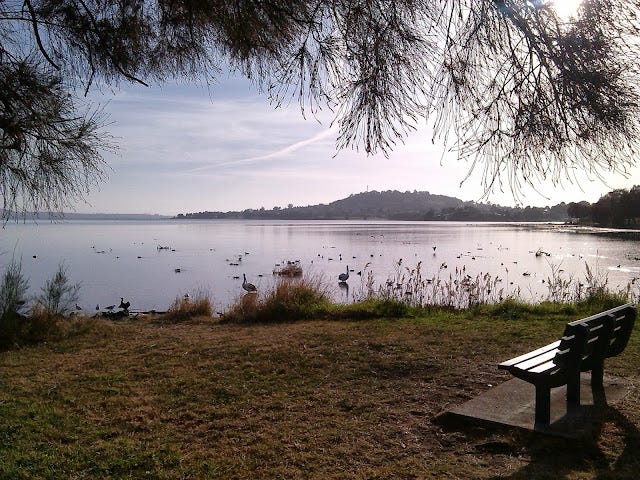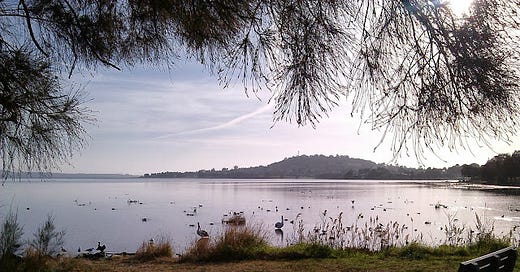
Illawara, NSW, Australia
He had already fled the obscene places, of flash and trash and inebriated laughter. He already knew there wasn't any salvation in dissolution; that their drunken heroes of the past had died young and may have left their streaks of genius, their scribbles in the sand, but that was all. We took one step at a time into a greater life. He wasn't depressed anymore; and didn't know who he was. Of paramount importance, whatever it had been. They came crawling through the gutters, underneath the doors. Their howling choruses, their dark traces. He was fragile and yet important, invisible yet still there. At last he could resume his rightful place in the ceiling, the eternal observer; quiet, nobody knew he was there. And so every drunken legend passed away. And he slept like a normal person. Torrid disentangling dreams; of Carolyne Overington, for God's sake, how much did you make from that last book, he was demanded, in some small News Limited room. Before everything went away.
And then, and then he didn't know anymore. He could still hear them far away, disentangling with the morning radios, the morning news on the television, people getting ready for work. He didn't believe what ha happened; and if he was privy, wouldn't have believed what was to happen next. But each day remained in the fervent present, if it could be called that, well, unique days working quietly, all the way, all the way. As torrid as it was, he couldn't go there, not back to the past, not anywhere. There was a system that made this worthwhile, a system which would rescue him from wherever it was. A dark disentanglement of financial lines, obligations, commitments, of tightness flowing from extravagance, of a past of unappreciative vultures, slimy little thieves, horror show faces he would never trust again, a disentangling, disparate string of irreverence and disregard, of contemptuous, disrespectful voices raised up in a chorus, of liars he had temporarily, occasoinally believed, and of an overwhelming sadness. He had wanted to drink himself to death; indulgent as that now seemed.
In the past, in the past. Some days that was all there seemed to be. His mother was in her eighties and all her friends, people she had spoken to almost daily for decades, were shuffling off the mortal coil. "Dear father," she gasped at the kitchen sink one evening, as his drunken uncle called on their services. Dear father, as in take me to the rapture. "My friends aren't doing well," she observed, suddenly frail again. As if life was folding in upon them. As in the acres, in the streams and screams of discontent, there was nothing but a dissolution of all that had once been. "It's a dying world," she would say. But then, he had been in Nepal, where swarms of children ran and played under giant mango trees, playing cricket on a makeshift pitch, the souns of their games caught in the overwhelming air. Sometimes he would find a little bar and make waste of himself, a pathetic attempt at communication. We drank for company and ended up alone, the old saying went, and for him it was often true enough.
Pictures of Lumbini, Buddha's birthplace, still floated through his head, as if he would rather be there and here. Yet, for whatever reason, he was meant to be here. What, to reorganise, regroup, to face the penalties for his mistakes? He didn't much know, and didn't much care; because every day was vivid in its own way; and as he had put it in an email to an old lover, life remained interesting. If not exactly affluent; not always fulfilling. We get what we need, not what we want, was another old saying that drifted through jumbled dreams; and all in all, was here because he had been there. It had come as a surprise that he missed the routine of work. Perhaps he was made for greater things, but remained frightened. Perhaps he had run his course, and it was for someone else to watch the entrails rot into the desert sands. He didn't know. Do the best by the day. All these things, of unsanctioned love lost in bars and clubs and disappearing into disco beats; flocks of queens cawing at each other, ancient devices, old fashioned corruption, chambers in which he had no desire to dwell, a prisoner in a former life. He still paced, just as his ancestor had done. And waited, sometimes, for life to happen. And in the meantime worked.
THE BIGGER STORY:
http://qz.com/130149/why-thailand-uses-slaves-from-myanmar-to-peel-its-shrimp/
In some ways, Thailand is a fairytale of economic development. Thanks in large part to exports, its GDP per capita is now eight times what it was in 1980. Its people live 15 years longer than they did in 1970. They’re now better educated, so they are doing more high-value jobs. It’s also an exemplar of family planning; 80% of the reproducing population uses birth control, compared with just 15% in 1970.
+
Which helps explain why Thailand’s unemployment rate is just 0.9%—the lowest among the world’s major economies.
+

But the upshot is that Thailand desperately needs cheap workers to keep growing. Thais are too educated and too few to do the menial jobs.
+
The solution? Migrants. And the cheapest of all are undocumented, trafficked and often forced laborers from Myanmar, and, to a lesser extent, Cambodia and Laos.
+
Thailand’s shrimp-peeling business is a classic example, as the Environmental Justice Foundation, a non-governmental organization, highlighted in a recent report (pdf). It’s a critical industry for Thailand, which typically produces one quarter of the 2.6 million or so tonnes (2.9 million tons) of the planet’s annual shrimp output. Some 90% of that goes abroad, making Thailand the world’s biggest exporter of shrimp. That brought in $3.5 billion in 2011, just shy of 1% of GDP.
+
Most of that shrimp enters importing markets already peeled, beheaded, deveined and gutted. But dismantling tiny crustaceans is laborious. The conditions in “peeling sheds,” reports the EJF, are noxious, the hours long, and the pay dreadful.
+
Unsurprisingly, Thais long since stopped taking those jobs. Migrants, mostly from Myanmar, can earn more there than they would at home, and thus send money to support their families. Though Thailand’s estimated 3 million migrants make up 10% of its workforce, in seafood processing, they compose 90%.
KEVIN Rudd's brother says when it comes to the leadership ambitions of his sibling, the Australian people should "never say never".
Greg Rudd - who unsuccessfully bid to become an Independent senator at the September election - said that while he had "no idea what's in his head", his brother's hunger for leadership may still be unsatisfied.
Gillard takes swipe at Rudd takeover
Bowen backs Rudd after Gillard interview
"All I'll say is that while he's still in politics, you can't rule anything out," Mr Rudd said from London.
"It's like (Sean Connery) when he said he'd never play James Bond again and the lesson of that was that you never say never. But I have no idea what's in his head. A lot of it will depend on the upcoming leaders."
Greg Rudd took aim at the "showbiz" style of his brother's election campaign, saying much of it was about "trying to run the news story of the day" and instead Kevin "should have focused on policy".
Mr Rudd said the controversial Northern Territory economic zone policy and the Brisbane navy plan were examples of that.
"Because they hadn't been out in the public arena and there hadn't appeared to be a lot of deep thought and discussion about them, it looked as though, to all and sundry, that they were just ideas and thoughts that were just coming out on the spur of the moment because they might have a political effect," Mr Rudd said.



